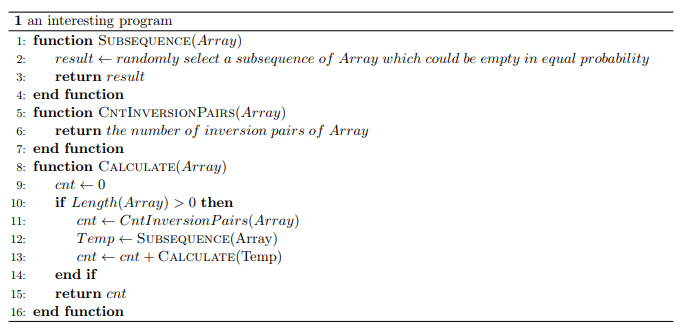
| Online Judge | Online Exercise | Online Teaching | Online Contests | Exercise Author |
|
F.A.Q Hand In Hand Online Acmers |
Best Coder beta VIP | STD Contests DIY | Web-DIY beta |
Everything Is Generated In Equal Probability
Time Limit: 2000/1000 MS (Java/Others) Memory Limit: 131072/131072 K (Java/Others)Total Submission(s): 1070 Accepted Submission(s): 756
Problem Description
One day, Y_UME got an integer $N$ and an interesting program which is shown below:

Y_UME wants to play with this program. Firstly, he randomly generates an integer $n \in [1, N]$ in equal probability. And then he randomly generates a permutation of length $n$ in equal probability. Afterwards, he runs the interesting program(function calculate()) with this permutation as a parameter and then gets a returning value. Please output the expectation of this value modulo $998244353$.
A permutation of length $n$ is an array of length $n$ consisting of integers only $\in [1, n]$ which are pairwise different.
An inversion pair in a permutation $p$ is a pair of indices $(i, j)$ such that $i > j$ and $p_i < p_j$. For example, a permutation $[4, 1, 3, 2]$ contains $4$ inversions: $(2, 1), (3, 1), (4, 1), (4, 3)$.
In mathematics, a subsequence is a sequence that can be derived from another sequence by deleting some or no elements without changing the order of the remaining elements. Note that empty subsequence is also a subsequence of original sequence.
Refer to https://en.wikipedia.org/wiki/Subsequence for better understanding.

Y_UME wants to play with this program. Firstly, he randomly generates an integer $n \in [1, N]$ in equal probability. And then he randomly generates a permutation of length $n$ in equal probability. Afterwards, he runs the interesting program(function calculate()) with this permutation as a parameter and then gets a returning value. Please output the expectation of this value modulo $998244353$.
A permutation of length $n$ is an array of length $n$ consisting of integers only $\in [1, n]$ which are pairwise different.
An inversion pair in a permutation $p$ is a pair of indices $(i, j)$ such that $i > j$ and $p_i < p_j$. For example, a permutation $[4, 1, 3, 2]$ contains $4$ inversions: $(2, 1), (3, 1), (4, 1), (4, 3)$.
In mathematics, a subsequence is a sequence that can be derived from another sequence by deleting some or no elements without changing the order of the remaining elements. Note that empty subsequence is also a subsequence of original sequence.
Refer to https://en.wikipedia.org/wiki/Subsequence for better understanding.
Input
There are multiple test cases.
Each case starts with a line containing one integer $N(1 \leq N \leq 3000)$.
It is guaranteed that the sum of $N$s in all test cases is no larger than $5 \times 10^4$.
Each case starts with a line containing one integer $N(1 \leq N \leq 3000)$.
It is guaranteed that the sum of $N$s in all test cases is no larger than $5 \times 10^4$.
Output
For each test case, output one line containing an integer denoting the answer.
Sample Input
1 2 3
Sample Output
0 332748118 554580197
Source
| Home | Top |
Hangzhou Dianzi University Online Judge 3.0 Copyright © 2005-2024 HDU ACM Team. All Rights Reserved. Designer & Developer : Wang Rongtao LinLe GaoJie GanLu Total 0.000000(s) query 1, Server time : 2024-11-21 21:30:46, Gzip enabled |
Administration |